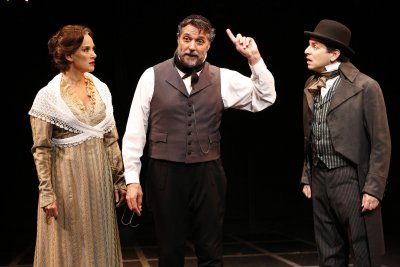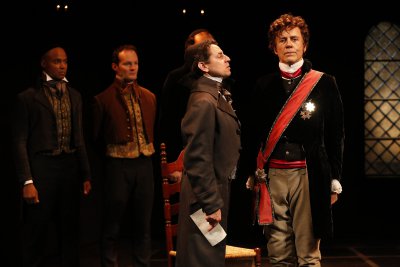Rothschild & Sons
Bock and Harnick musical based on the lives of the famed Jewish banking family returns in a streamlined version with 13 trunk songs and more focused plot.

Bock and Harnick musical based on the lives of the famed Jewish banking family returns in a streamlined version with 13 trunk songs and more focused plot.
[avatar user=”Victor Gluck” size=”96″ align=”left” ] Victor Gluck, Editor-in-Chief[/avatar] Although The Rothschilds, the seventh and last collaboration of the songwriting team of Jerry Bock and Sheldon Harnick, ran 505 performances on Broadway and garnered Tony Awards for Best Actor in a Musical (Hal Linden) and Best Supporting Actor in a Musical (Keene Curtis), it has never been as popular as the team’s beloved Fiddler on the Roof or She Loves Me, both being revived on Broadway this season. Even a better received Off Broadway revival in 1990 with Mike Burtyn and Robert Cuccioli as Meyer and Nathan Rothschild, respectively, failed to elevate the fortunes of this historical musical.
The surviving original creators, book writer Sherman Yellen and lyricist Sheldon Harnick, have written a new streamlined version of the show now called Rothschild & Sons which is being given its world premiere by the York Theatre Company. With a cast of eleven (most playing multiple roles) led by Cuccioli now playing patriarch Meyer and an orchestra of three, the show is a powerful study of anti-Semitism in Europe at the end of the 18th century and the beginning of the 19th century and the desire of the Rothschild family to break down both the walls of poverty and those of prejudice. While the new adaptation performed in one act is both engrossing and admirable, it may not be the definitive final version as it is devoid of humor, a necessary ingredient to make a musical popular.
Based on the first third of Frederic Morton’s bestselling chronicle, The Rothschilds, the musical begins in 1772 when Meyer returns to the Jewish ghetto of Frankfurt from Hanover having just left his clerking job. He tells his waiting fiancée Gutele than he has decided to stay in Frankfurt and build a life there as a shopkeeper and a dealer in rare coins rather than return to Hanover as they had planned. Knowing that Frankfurt’s strict marriage quota only allowed twelve Jewish weddings a year, Meyer attracts the attention of Prince William of Hesse at the Frankfurt Fair and obtains his permission to marry, beginning a profitable association between the two. As his sons grow up, they are champing at the bit to leave a city where they periodically have to hide in the cellar from the pogroms of the disgruntled natives. When his five boys are almost adults, Meyer offers them to the prince to negotiate a Danish loan to his cousin, King Christian. Thus begins the family’s rise in the banking business.
When Napoleon chases Prince William from his domain, Meyer sends his sons all over Europe to collect the prince’s debts before they fall into the hands of the French: Amshel to Prussia, Salomon to Vienna, Jacob to Prague, Kalmann to Hamburg, and headstrong, forward-looking Nathan to London to invest the proceeds. Eventually, Nathan becomes so successful that he begins making decisions on his own to the annoyance of his father back home. When the English need a loan to help end the Napoleonic Wars, Nathan comes up with a scheme to fund the loan only if England sees to it that Austria and Germany lift their restrictions on the Jews and take down the walls of the ghettoes. Ultimately, Nathan finds himself face to face with Prince Metternich, Chancellor of the Austro-Hungarian Empire and the most powerful man in Europe.

Curtis Wiley, Jamie LaVerdiere, Christopher M. Williams and Mark Pinter in a scene from “Rothschild & Sons” (Photo credit: Carol Rosegg)
As always intended, the Yellen’s new book now focuses directly on the fortunes of the father and five sons, eliminating Nathan’s love affair that originally occupied much of the second half. While the musical is more centered on its story of the rise of the Rothschilds as a banking empire, it does seem less entertaining and more dramatic than the previous versions. The score includes nine songs from the 1970 premiere and 13 trunk songs cut from the show in tryouts. The best songs (“Sons,” “Everything,” “Rothschild and Sons,” “In My Own Lifetime” and the waltz, “Stability”) from the first version continue to be the most effective, while the new songs are serviceable but rather prosaic. The reduced orchestrations by Joseph Church which use a trio made up primarily of piano, violin and cello give the score a small sound which makes it appear much less melodic than previously.
Under the assured and vigorous direction of Jeffrey B. Moss, Cuccioli is a strong robust Meyer, a man of integrity and ingenuity. However, at the performance under review, some of his songs seemed out of his vocal range. As his middle son Nathan, Christopher M. Williams demonstrates the necessary qualities of impatience, boldness and that of a risk-taker, but at times he is bland when he should be more decisive. Glory Crampton as Meyer’s wife Gutele gives able support but does not age much in the course of the four decades of the show’s plot. Most memorable is Mark Pinter as a series of imperious and scornful authority figures including Prince William and Prince Metternich. David Bryant Johnson, Jamie LaVerdiere, Nicholas Mongiardo-Cooper and Curtis Wiley playing the other Rothschild sons make them decidedly different from each other.
In James Morgan’s clever yet simple unit set, the production makes excellent use of the York’s small stage. However it is Carrie Robbins’ elegant and authentic period costuming which creates the visual splendor missing from the scenic design. The necessary 17th and 18th century wigs and hair design is the work of Paul Huntley Productions. Rothschild & Sons is a strong, sturdy work of musical theater, a rugged dramatization of a now little-known period in European and Jewish history.
Rothschild & Sons (through November 8, 2015)
The York Theatre Company
Theater at Saint Peter’s, 619 Lexington Avenue at 54th Street, in Manhattan
For tickets, call 212-935-5820 or visit http://www.yorktheatre.org
Running time: 95 minutes with no intermission






Leave a comment